The AMD 2nd Gen Ryzen Deep Dive: The 2700X, 2700, 2600X, and 2600 Tested
by Ian Cutress on April 19, 2018 9:00 AM ESTCPU Encoding Tests
One of the interesting elements on modern processors is encoding performance. This includes encryption/decryption, as well as video transcoding from one video format to another. In the encrypt/decrypt scenario, this remains pertinent to on-the-fly encryption of sensitive data - a process by which more modern devices are leaning to for software security. Video transcoding as a tool to adjust the quality, file size and resolution of a video file has boomed in recent years, such as providing the optimum video for devices before consumption, or for game streamers who are wanting to upload the output from their video camera in real-time. As we move into live 3D video, this task will only get more strenuous, and it turns out that the performance of certain algorithms is a function of the input/output of the content.
All of our benchmark results can also be found in our benchmark engine, Bench.
7-Zip 9.2: link
One of the freeware compression tools that offers good scaling performance between processors is 7-Zip. It runs under an open-source licence, is fast, and easy to use tool for power users. We run the benchmark mode via the command line for four loops and take the output score.
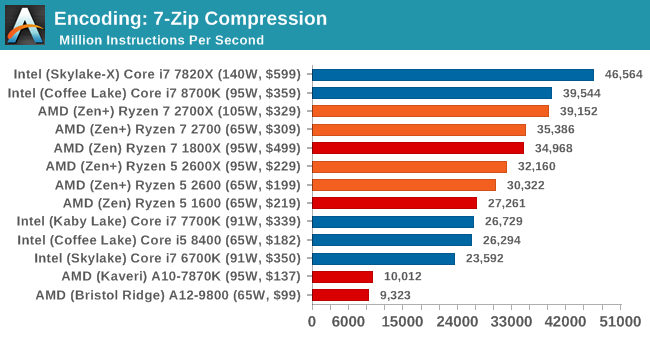
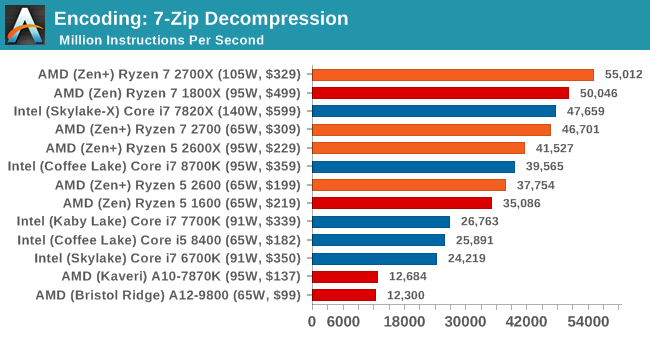
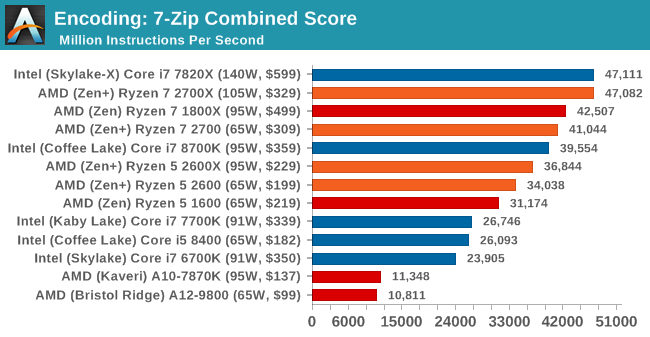
WinRAR 5.40: link
For the 2017 test suite, we move to the latest version of WinRAR in our compression test. WinRAR in some quarters is more user friendly that 7-Zip, hence its inclusion. Rather than use a benchmark mode as we did with 7-Zip, here we take a set of files representative of a generic stack (33 video files in 1.37 GB, 2834 smaller website files in 370 folders in 150 MB) of compressible and incompressible formats. The results shown are the time taken to encode the file. Due to DRAM caching, we run the test 10 times and take the average of the last five runs when the benchmark is in a steady state.
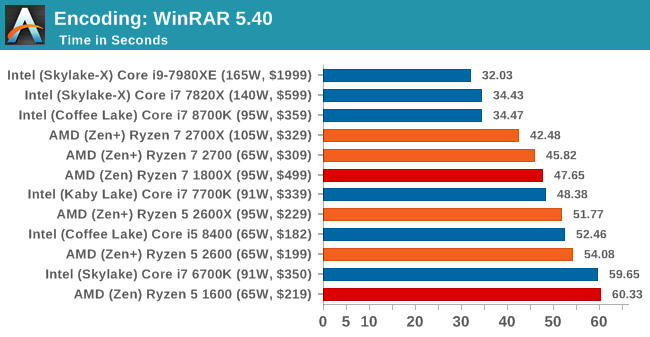
WinRAR requires a good memory base, so we see the quad-channel processors heading up the pack. The high IPC of the Core i7-8700K also does well.
AES Encoding
Algorithms using AES coding have spread far and wide as a ubiquitous tool for encryption. Again, this is another CPU limited test, and modern CPUs have special AES pathways to accelerate their performance. We often see scaling in both frequency and cores with this benchmark. We use the latest version of TrueCrypt and run its benchmark mode over 1GB of in-DRAM data. Results shown are the GB/s average of encryption and decryption.
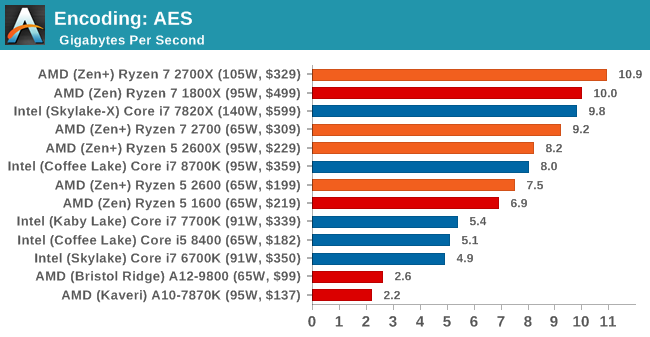
HandBrake v1.0.2 H264 and HEVC: link
As mentioned above, video transcoding (both encode and decode) is a hot topic in performance metrics as more and more content is being created. First consideration is the standard in which the video is encoded, which can be lossless or lossy, trade performance for file-size, trade quality for file-size, or all of the above can increase encoding rates to help accelerate decoding rates. Alongside Google's favorite codec, VP9, there are two others that are taking hold: H264, the older codec, is practically everywhere and is designed to be optimized for 1080p video, and HEVC (or H265) that is aimed to provide the same quality as H264 but at a lower file-size (or better quality for the same size). HEVC is important as 4K is streamed over the air, meaning less bits need to be transferred for the same quality content.
Handbrake is a favored tool for transcoding, and so our test regime takes care of three areas.
Low Quality/Resolution H264: Here we transcode a 640x266 H264 rip of a 2 hour film, and change the encoding from Main profile to High profile, using the very-fast preset.
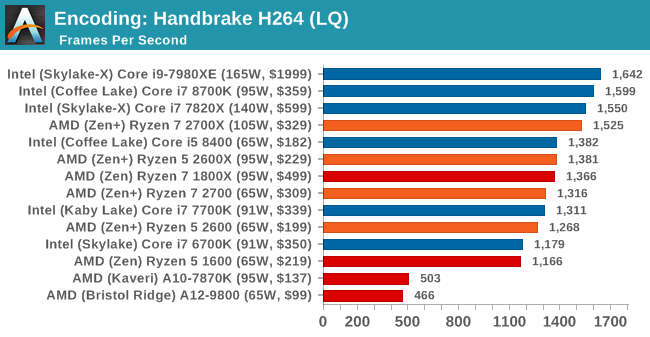
High Quality/Resolution H264: A similar test, but this time we take a ten-minute double 4K (3840x4320) file running at 60 Hz and transcode from Main to High, using the very-fast preset.
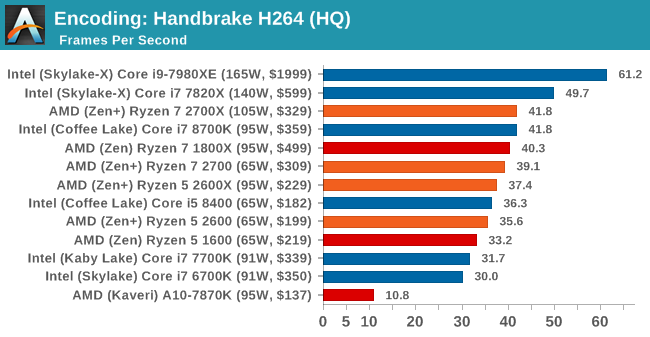
HEVC Test: Using the same video in HQ, we change the resolution and codec of the original video from 4K60 in H264 into 4K60 HEVC.
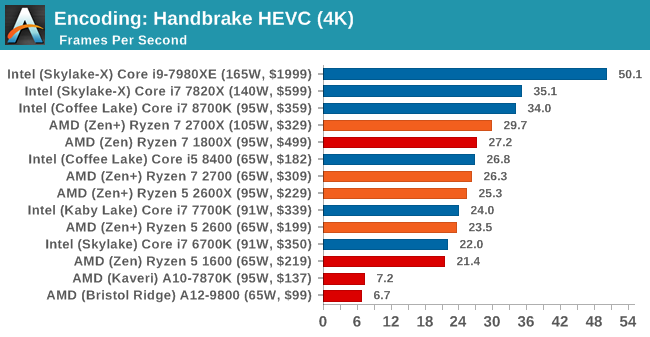
For HandBrake video encoding of large frames, there is a bump with the new Ryzen-2000 series processors over the previous generation, however there is still a gap up to the Core i7-8700K. The Core i5-8400 puts in a good showing here, above all but the best Ryzen parts.










545 Comments
View All Comments
jjj - Thursday, April 19, 2018 - link
I was wondering about gaming, so there is no mistake there as Ryzen 2 seems to top Intel.As of right now, I don't seem to find memory specs in the review yet, safe to assume you did as always, highest non-OC so Ryzen is using faster DRAM?
Also yet to spot memory letency, any chance you have some numbers at 3600MHz vs Intel? Thanks.
jjj - Thursday, April 19, 2018 - link
And just between us, would be nice to have some Vega gaming results under DX12.aliquis - Thursday, April 19, 2018 - link
Would be nice if any reviewer actually benchmarked storage devices maybe even virtualization because then we'd see meltdown and spectre mitigation performance. Then again do AMD have any for spectre v2 yet? If not who knows what that will do.HStewart - Thursday, April 19, 2018 - link
I notice that that systems had higher memory, but for me I believe single threaded performance is more important that more cores. But it would be bias if one platform is OC more than another. Personally I don't over clock - except for what is provided with CPU like Turbo mode.One thing that I foresee in the future is Intel coming out with 8 core Coffee Lake
But at least it appears one thing is over is this Meltdown/Spectre stuff
Lolimaster - Thursday, April 19, 2018 - link
Intel 8 core CL won't stop the bleeding, lose more profits making them "cheap" vs a new Ryzen 7nm with at least 10% more clocks and 10% more IPC, RIP.HStewart - Thursday, April 19, 2018 - link
I just have to agree to disagree on that statement - especially on "cheap" statementACE76 - Thursday, April 19, 2018 - link
CL can't scale to 8 cores...not without done serious changes to it's architecture...Intel is in some trouble with this Ryzen refresh...also worth noting is that 7nm Ryzen 2 will likely bring a considerable performance jump while Intel isn't sitting on anything worthwhile at the moment.Alphasoldier - Friday, April 20, 2018 - link
All Intel's 8cores in HEDT except SkylakeX are based on their year older architecture with a bigger cache and the quad channel.So if Intel have the need, they will simply make a CL 8core. 2700X is pretty hungry when OC'd, so Intel don't have to worry at all about its power consuption.
moozooh - Sunday, April 22, 2018 - link
> 2700X is pretty hungry when OC'dAnd Intel chips aren't? If Zen+ is already on Intel's heels for both performance per watt and raw frequency, a 7nm chip with improved IPC and/or cache is very likely going to have them pull ahead by a significant margin. And even if it won't, it's still going to eat into Intel's profit as their next tech is 10nm vs. AMD's 7nm, meaning more optimal wafer estate utilization for the latter.
AMD has really climbed back at the top of their game; I've been in the Intel camp for the last 12 years or so, but the recent developments throw me way back to K7 and A64 days. Almost makes me sad that I won't have any reason to move to a different mobo in the next 6–8 years or so.
mapesdhs - Friday, March 29, 2019 - link
Amusing to look back given how things panned out. So yes, Intel released the 9900K, but it was 100% more expensive than the 2700X. :D A complete joke. And meanwhile tech reviewers raved about a peasly 5 to 5.2 oc, on a chip that already has a 4.7 max turbo (major yawn fest), focusing on specific 1080p gaming tests that gave silly high fps number favoured by a market segment that is a tiny minority. Then what happens, RTX comes out and pushes the PR focus right back down to 60Hz. :DI wish people to stop drinking the Intel/NVIDIA coolaid. AMD does it aswell sometimes, but it's bizarre how uncritical tech reviewers often are about these things. The 9900K dragged mainstream CPU pricing up to HEDT levels; epic fail. Some said oh but it's great for poorly optimised apps like Premiere, completely ignoring the "poorly optimised" part (ie. why the lack of pressure to make Adobe write better code? It's weird to justify an overpriced CPU on the back of a pro app that ought to run a lot better on far cheaper products).